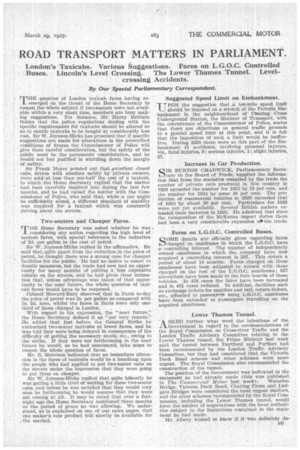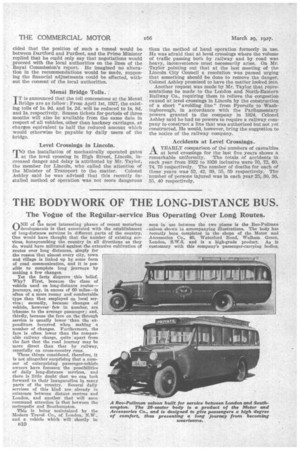ROAD TRANSPORT MATTERS IN PARLIAMENT.
Page 79

Page 80

If you've noticed an error in this article please click here to report it so we can fix it.
London's Taxicabs. Various Suggestions. Fares on L.G.O.C. Controlled Buses. Lincoln's Level Crossing. The Lower Thames Tunnel. Levelcrossing Accidents.
By Our Special Parliamentary Correspondent.
T"question of London taxicab fares having reemerged on the threat of the Home Secretary to reopen the whole subject if two-seaters were not available within a very short time, members are busy making suggestions. Foi instance, Sir Harry Brittain thinks that the police regulations dealing with the specific requirements for taxicabs should be altered so as tp enable taxicabs to be bought at considerably less cost. Sir W. Joynson-Hicks has promised that if specific suggestions are made for alterations in the prescribed conditions of fitness the Commissioner of Police will give them careful consideration, but the safety of the public must be the paramount consideration, and he would not feel justified in whittling down the margin of safety.
Sir Prank Meyer pointed out that excellent closed cabs, driven with absolute safety by private owners, were sold at less than one-half the cost of a taxicab, to which the Home Secretary replied that the matter had been carefully inquired into during the last few months, and he had raised the matter with the Commissioner of Police, who said that, while a car might be sufficiently sound, a different standard of stability was required for a taxicab which was constantly driving about the streets.
Two-seaters and Cheaper Fares.
rrHE Home Secretary was asked whether he was 1_ considering any action regarding the high level of taxicab fares, with special reference to the reduction of 2d per gallon in the cost of petrol.
Sir W. Joynson-Hicks replied in the affirmative. He said that, quite apart from the reduction in the price of petrol, he thought there was a strong case for cheaper facilities for the public. He had no desire to resort to drastic measures, but the trade had DOW had an opportunity for many months of putting a less expensive vehicle on the streets, and he had given clear intimation that, unless advantage was taken of that opportunity in the near future, the whole. question of taxicab fares would have to be reopened.
Colonel Howard-Bury observed that in Paris to-day the price of petrol was 2s. per gallon as compared with Is. 3d. here, whilst the fares in Paris were only onethird of those charged in London.
With regard to his expression, the 'near future," the Home Secretary defined it as " not very remote." He added that just before the General Strike he authorized two-seater taxicabs at lower fares, and he was told they were being delayed in consequence of the difficulty crf getting the necessary steels, etc., owing to the strike. It they were not forthcoming in the near future he would, as he had announced, take steps to reopen the whole question of fares.
Mr. R. Morrison indicated that an immediate alterathin in the fares of taxicabs would be a handicap upon the people who had applied to put two-seater cabs on the streets under the impression that they were going to put them on cheaper. Sir W: .loynson-Hicks replied that quite honestly he was getting a little tired of waiting for these two-seater cabs, and unless he was satisfied that they would very soon be forthcoming he would assume that they were not coming at all: It may be noted that over a fortnight ago the Home Secretary mentioned three months as the period of grace he was allowing. We understand, as is explained on one of our news pages, that one maker's new product will shortly be available for the market.
Suggested Speed Limit on Embankment.
T TPON the suggestion that .a ten-mile speed limit should be imposed on a stretch of the Victoria Embankment in the neighbourhood of Charing Cross Underground Station, the Minister of Transport, with the concurrence of the Commissioner of Police, states that there are objections on general traffic grounds to a special speed limit at this point, and it is felt that the imposition of such a limit would be ineffective. During 1926 there were at this part of the Embankment 41 accidents, involving personal injuries, viz., fatal injuries, 3; serious injuries, 1; slight injuries, 37.
Increase in Car Production.
SIR BURTON CHADWICK, Parliamentary Secretary to the Board of Trade, supplied the information that from the statistics compiled by the trade the number of private cars produced in this country in 1926 exceeded the number for 1925 by 19 per cent, and the number for 1924 by some 48 per cent. The production of commercial vehicles in 1925 exceeded that of 1924 by about 20 per cent. Particulars for 1926 were not yet available. Several British makers extended their factories in 1926. He admitted that since the reimposition of the McKenna import duties there had been a very considerable expansion of, the trade.
Fares on L.G.O.C. Controlled Buses.
SaOME details are' officially given regarding fares ...)charged on omnibuses in which the L.G.O.C. have acontrolling interest. The number of independently ,owned omnibuses in which the company have now acquired a controlling interest is 207. This covers a period of about 18 months. Fares charged on those omnibuses have been adjusted to accord with those charged on the rest of the L.G.O.C. omnibuses; 937 alterations have been made in the fare boards of those vehicles. In 476 cases the fares have been increased and in 461 cases reduced. In addition, facilities such as exchange tickets for omnibus and rail, return tickets, etc., afforded to passerrsers using L.G.O.C. omnibuses have been extended to passengers travelling on the acquired omnibuses.
Lower Thames Tunnel.
ASKED further what wer6 theintentions of the Government in regard to the recommendations of the Royal Commission on Cross-river Traffic and the London Traffic Advisory Committee relating to the Lower Thames tunnel, the Prime Minister last week said the I tunnel between Dartford and Purfleet had been recommended by the London Traffic Advisory Committee, but they had considered that the Victoria Dock Road -scheme and other schemes were more urgent. The Royal Commission also recommended the construction of the tunnel.-.
The position of the Government was indicated in the statement he bad already made (this was published
in The Commercial Motor last week). Waterloo Bridge, Victoria Dock Road, Charing Cross and Ludgate Bridges were considered the most urgent matters, and the other schemes recommended by the Royal Commission, including the Lower Thames tunnel, would form the subject of negotiations with the local authorities subject to the limitations contained in the statement he had made.
Mr. Albery wished to know if it was definitely del:0
cided that the position of such a tunnel would be between Dartford and Purfleet, and the Prime Minister replied that he Mild only say that negotiations would proceed with the local authorities on the lines of the Royal Commission's report. He imagined no alteration in the recommendations would be made, suPPosing the financial adjustments could be effected, without the consent of the local authorities.
Menai Bridge Toils. '
TT is announced that the toll concessions at the 1Vienai -II-Bridge are as follow : From April 1st, 1927, the exdsting tolls of is. d. and is, 2d. will be reduced to is. Sd. and is. respectively. Season tickets for periods of three months will also be available from the same date in respect of all vehicles, other than hackney carriages, at charges equivalent to half the reduced amount which would otherwise be payable by daily users of the bridge.
Level Crossings in Lincoln.
TO the installation of mechanically operated gates at the level crossing in High Street, Lincoln, increased danger and delay Is attributed by Mr. Taylor, the member for Lincoln, who called the attention of the Minister of Transport to the matter. Colonel Ashley said he was advised that this recently installed method of operation was not more dangerous than the method of hand operation formerly in use. He was afraid that at level crossings where the volume of traffic passing both by railway and by road was heavy, inconvenience must necessarily arise. On Mr. Taylor pointing out that at the last meeting of the Lincoln City Council a resolution was passed urging that something should be done to remove the danger, Colonel Ashley promised to have the matter looked into.
Another request was made by Mr. Tayior that representations be made to the London and North-Eastern Railway Co., requiring them to relieve the congestion caused at level crossings in Lincoln by the construction of a short " avoiding line" from Pyeroife to Washingborough, in accordance with the Parliamentary powers granted to the company in 1924. Colonel Ashley said he had no powers to require a railway, company to construct a line that was authorized but not yet constructed. He would, however, bring the suggestion to the notice of the railway company.
Accidents at Level Crossings.
A, YEARLY comparison of the numbers of casualties IA_ at level crowhigs for the last five years shows a remarkable uniformity. The totals of accidents in each year from 1922 to 1926 inclusive were 70, 72, 60, 74, 70 respectively. The number of deaths for each of these years was 52, 42, 39, 55, 59 respectively. The number of persons injured was in each year 25, 30, 36, 35, 40 respectively.












































































































































































